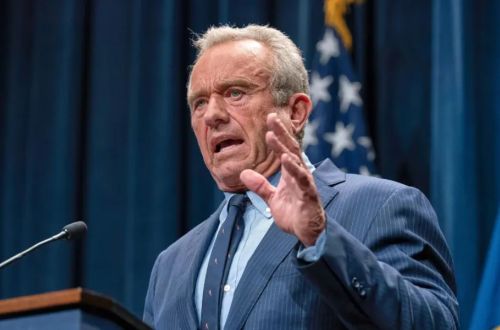

The proposed cuts to Narcan funding are part of a larger pattern.

By Matthew A. McIntosh
Public Historian
Brewminate
Introduction
In a move that has ignited widespread concern among public health experts and community advocates, U.S. Secretary of Health and Human Services Robert F. Kennedy Jr. is overseeing a proposed federal budget that includes the elimination of the $56 million annual grant dedicated to Narcan (naloxone) education and distribution. This funding has been instrumental in training emergency responders and making the life-saving opioid overdose reversal drug accessible to communities across the nation.
Narcan, known for its rapid action in reversing opioid overdoses, has been a cornerstone in combating the opioid crisis. Since its over-the-counter availability in March 2023, the United States has witnessed a significant decline in drug overdose deaths—25.7% nationwide and nearly 36% in Michigan alone. The federal grant has facilitated the training of over 66,000 first responders in 2024, equipping them with the necessary tools to save lives.
A Shift in Addiction Treatment Philosophy
Kennedy’s approach to addiction treatment marks a departure from evidence-based medical interventions. He has advocated for “wellness farms,” facilities where individuals struggling with addiction can undergo rehabilitation through spiritual and community-based methods, rather than relying on medications like methadone or buprenorphine. Critics argue that this perspective undermines decades of progress in treating addiction as a medical condition rather than a moral failing.
Maia Szalavitz, an author and addiction policy expert, expressed concern: “We’ve spent many years trying to get people to take up these medications that we know cut your death risk in half, and [Kennedy] seems to want to go backwards on all that.” The skepticism towards medication-assisted treatment has alarmed many in the medical community, who fear that defunding programs like Narcan distribution could reverse the positive trends in overdose mortality rates.
Broader Implications for Public Health Policy
The proposed cuts to Narcan funding are part of a larger pattern under Kennedy’s tenure at HHS. The department has also seen reductions in programs aimed at preventing childhood lead poisoning, supporting LGBTQ youth through suicide prevention initiatives, and funding domestic HIV prevention efforts.
These policy shifts have raised questions about the administration’s commitment to science-based public health strategies. Kennedy’s leadership of the “Make America Healthy Again” Commission has further fueled controversy, particularly after reports emerged that the commission’s preliminary report contained fabricated citations.
Community Response and Advocacy
Local organizations and public health advocates have voiced strong opposition to the proposed defunding of Narcan programs. Angela Thomson of the Huron County Recovery and Prevention Coalition emphasized the critical role of Narcan in rural communities: “Without these funds, we’ll be unable to supply emergency responders and community members with Narcan. That will result in more overdose deaths and strain already limited local resources.”
As the debate continues, stakeholders across the country are urging the administration to reconsider the proposed cuts and to prioritize evidence-based interventions in addressing the ongoing opioid crisis.
Originally published by Brewminate, 06.04.2025, under the terms of a Creative Commons Attribution-NonCommercial-NoDerivatives 4.0 International license.


